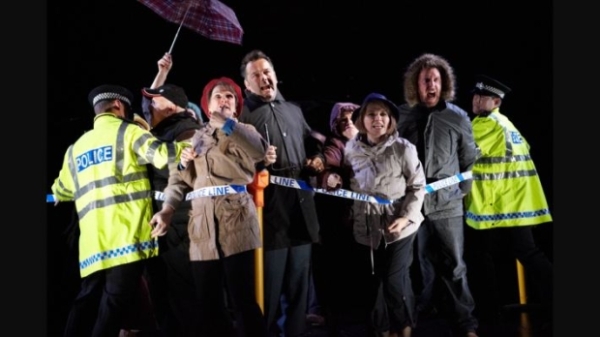Catherine Love: Musical matters
Love it or hate it, is there a limit to what subject matter the musical form can be used to tackle?

© Mark Douet
The musical is that strange thing: a form both beloved and maligned. While it still attracts sniffy dismissals from some quarters, others are devoted in their passion for the genre, willing to queue round the block for returns and spend the last of their wage packet on extortionately priced West End tickets. But is there a limit to what subject matter the musical form can carry – or, perhaps, what we think it can carry?
There is a tendency to think musical and think tap dancing, jazz hands and light as candyfloss plot. Of course, this is sometimes the case, and not always for the worse. The right kind of silly is a joyous, reviving tonic; I’m a total sucker for the likes of Singin’ in the Rain and Bugsy Malone, relishing every last ridiculous moment. The danger, however, is that the musical form simply slides back into comfortable territory, leaning on tried and tested silliness with none of the wit to back it up.
Theatre critic David Jays recently wrote engagingly on this topic, noting the current trend for the infantile and confessing to a weakness for "undiluted happiness" (there is a difference, of course, between happiness and downright stupidity). Jays also points to musicals’ capacity for darkness, particularly in the work of Sondheim and in Kander and Ebb masterpieces such as Cabaret, Chicago and The Scottsboro Boys. Musicals can definitely do grit.
Yet, despite this track record, we still grimace slightly at the prospect of musicals tackling difficult topics. London Road, the ingenious verbatim musical created by Alecky Blythe and Adam Cork, was extraordinary as much for defying the queasy scepticism that greeted its concept as it was for its brilliant execution. A musical about murdered prostitutes? Surely not, we all shook our heads.
Even greater outrage was provoked by a misleading headline in the Observer last year, which suggested that David Greig was writing a musical about the Anders Breivik massacre. Of course, The Events is far from fitting this description; Greig’s knotty, delicately handled play draws on ideas prompted by the killings in Norway rather than directly addressing them, while its musical element consists of an accompanying community choir. It might still be called a musical, at a stretch, but there is not a jazz hand in sight.
Given the initial indignation surrounding London Road and The Events, it will be interesting to see if the "musical" label taints War Correspondents, the latest piece of theatre to use song in an attempt to communicate weighty issues. The show, which takes the form of a verbatim song cycle, has been composed and co-directed by Helen Chadwick, incorporating interviews with war correspondents with experience of conflicts in Iraq, Chechnya, Georgia, Afghanistan, Liberia and Bosnia. The production’s copy, unsurprisingly and probably wisely, carefully avoids the word "musical".
But perhaps, by shying away from the vocabulary of musical theatre when difficult subject matter is involved, we are only contributing to the form’s perceived – and, in many cases, actual – conservatism. In the right hands, musicals can be bold, dark and even fiercely political. If we don’t celebrate those that are, we might find ourselves left with nothing but a line-up of identikit jukebox shows, film adaptations and lifeless revivals. And then what is there to sing and dance about?












